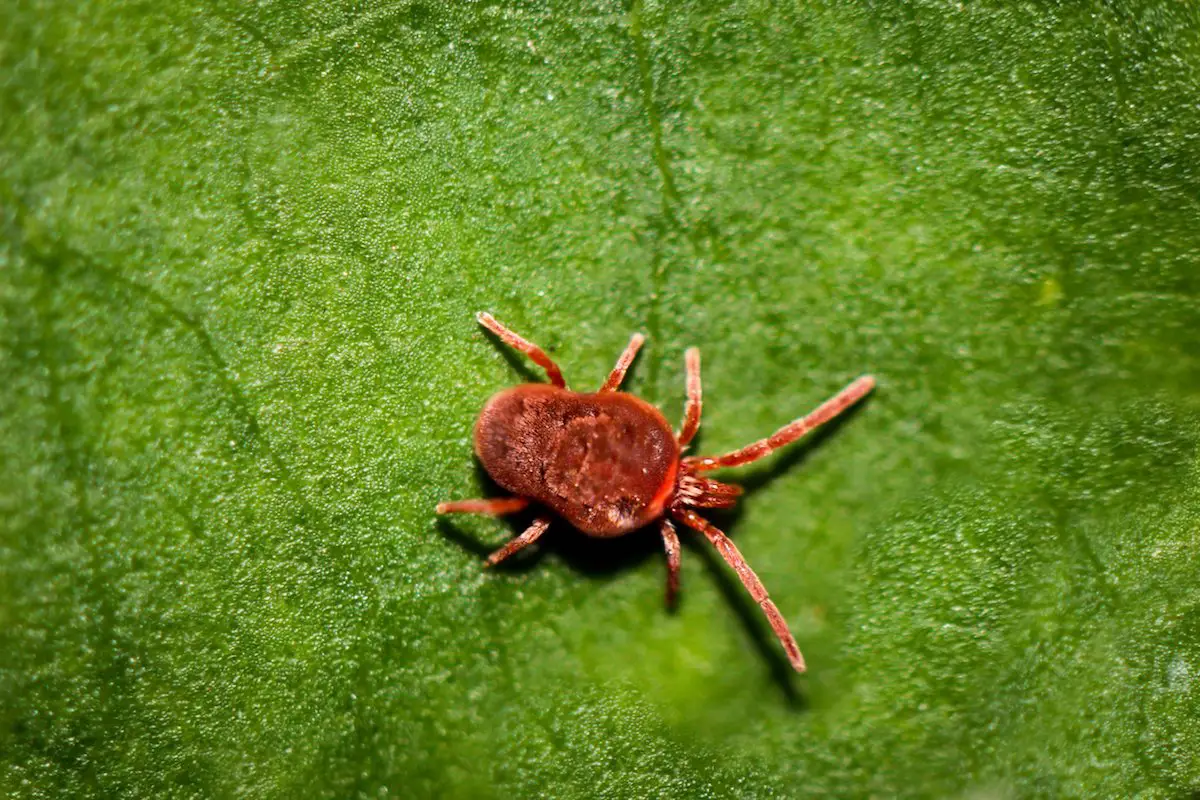How to Get Rid of Chiggers Naturally In 10 Ways
If you are anything like me, then you also hate the itchy feeling you get after being bit by a chigger. Now that it’s summertime, those pesky critters are out with a vengeance! You want to enjoy your backyard without getting eaten alive, but hate the thought of putting harsh chemicals on your skin. Luckily, we have found 10 completely natural solutions to your chigger problems. So how do you get rid of chiggers naturally? Here are some ways how to get rid of chiggers naturally that will actually work.
- Mowing
- Sulfur
- Essential Oil DIY Repellent
- Marigolds
- Diatomaceous Earth
- Removing Trash Cans From the Yard
- Epsom Salt, Dish Soap, and Vinegar DIY Repellent
- Aloe Vera
- Deter Host Animals
- Wash With Soap and Warm Water
Now that you have an idea of what some of our solutions are, let’s take a closer look at each option. In this post, we will break down the price and effectiveness of each natural solution.
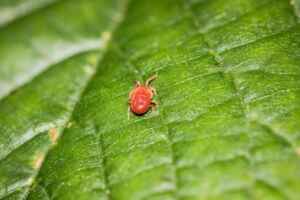
1. Mowing & Keeping Your Lawn Well Maintained
Chiggers like to hide in tall grass, so the simplest solution is to keep your lawn well manicured with short grass. By keeping the grass short, you are making it a less hospitable environment for the chiggers. Additionally, chiggers are attracted to the warmth of people and animals, so by mowing regularly, you are reducing the risk of contact with yourself, your children, or your pets. Mowing will also give you a chance to inspect your yard for a chigger infestation, so even if mowing is your least favorite chore, it is one of the most effective ways to get rid of chiggers naturally.

2. Sulfur
Sulfur is a great option for naturally repelling chiggers in your yard and off of yourself. Powdered sulfur can be applied directly onto the skin or on clothing to repel chiggers when you are outside. Because chiggers live in clusters, you will have to use a large amount of sulfur to treat your yard. When you find a cluster of chiggers, pour a generous amount of sulfur over them. The sulfur will not kill the chiggers, but it will make them leave the area. You can usually find bags of powdered sulfur in a home store or online.
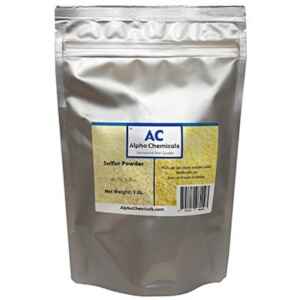
3. Essential Oils DIY Repellent
Maybe you are looking for a natural repellent that doesn’t have that eggy sulfur smell. You should try mixing essential oils to make a DIY repellent. There are a couple of different oils you can use that will help deter chiggers from biting you. We recommend lavender, citronella, tea tree, thyme, or peppermint (diluted as instructed on the bottle) and apply directly to the skin. If you are not a fan of those scents, you can try mixing 2 teaspoons of witch hazel with 5 drops of your preferred essential oil and 4 tablespoons of water. Once thoroughly mixed, this can be applied directly to the skin. For on-the-go usage, we recommend mixing your DIY solution and transferring it to a spray bottle. We know kids are impatient when it comes to playtime, so for ease and speed, spray them with your mixture before going outside. Reminder, this will not kill chiggers, only deter them from biting.
4. Planting Marigolds
Gardeners swear by planting Marigolds in their gardens to help deter chiggers. Although there is a lack of scientific evidence showing that Marigolds repel chiggers. Most likely, the presence of Marigolds help deters chiggers from gathering around your other plants due to the odor of the flower. This solution, while not the most effective on the list, could help deter the number of chiggers in your yard while also adding to the aesthetic of your yard. Marigolds can be purchased in most garden stores such as Lowe’s, Home Depot, and Walmart or online. If you would rather start your Marigolds as seeds, you can purchase the seeds at those same stores or online as well.
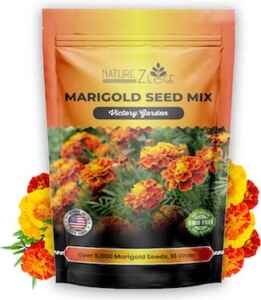
5. Diatomaceous Earth
Diatomaceous Earth is a type of naturally occurring rock that can be ground up finely into a powder. It has many uses, such as toothpaste, insecticide, litter boxes, and soil for potted plants. Because it is a naturally occurring material, it can be used as a natural insecticide to deter chiggers from infesting your yard. You can spread the Diatomaceous Earth powder into your yard. For best results, find a patch of grass that the chiggers are gathering in and dump a large amount of powder in the affected area.
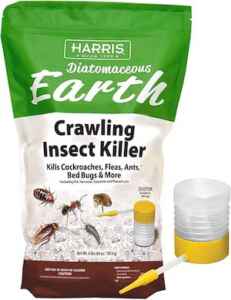
6. Remove Trash Cans From the Yard
Chiggers are naturally drawn to damp, cool, and dark spaces. Similar to other critters, they are also attracted to the smell of food. Because of this, your trash cans can be a target for a chigger infestation. We recommend moving your trash cans out of your yard and either somewhere sunny on the side of your house or into the garage. Leaving your trash cans in the shaded grass may seem appealing, especially if you have something stinky in there that can be made worse by the sun. However, if you are trying to avoid chiggers, moving your trash cans may be your best bet.
7. Epsom Salt, Dish Soap, and Vinegar DIY Repellent
One of the most cost-effective, natural solutions to chiggers is creating a DIY repellent out of common household items. Most homes will already have Epsom salt, dish soap, and vinegar at the ready. By mixing these materials together and putting it into a spray bottle, you can spray down yourself and your children before going out to play in the yard. As a reminder, this solution will not kill chiggers, but will only prevent them from nibbling on you and your children! We recommend checking with your vet before applying this mixture to your pets.
8. Aloe Vera
This solution may be the best option for sensitive skin. By mixing together 8 tablespoons of Aloe Vera, 1 tablespoon of vegetable glycerin, 10 drops of citronella oil, and 10 drops of geranium oil, you can create a chigger repellent for sensitive skin. This recipe is highly recommended for children who have sensitive skin or break out easily. In addition, it has a very pleasant smell! Aloe Vera can be purchased in most grocery and convenience stores, as well as online. Also, for an extra bit of fun, you can purchase your own Aloe Vera plant at a garden center store or online. Aloe Vera is a great plant to keep around the household and has many holistic uses.

9. Deter Host Animals (Squirrels, Amphibians, and Reptiles)
If your yard has frequent critter visitors, you may be inadvertently giving chiggers an open invitation to your yard. Chiggers are attracted to animals such as squirrels, frogs, and lizards to feed on their skin cells. We recommend making your backyard unwelcoming to these critters to help deter chiggers. If you have puddles in your backyard, try to dry up the water source or add drainage. Amphibians and reptiles will stay away from cool, wet, damp spaces. Noisemakers and pinwheels are great natural options for keeping squirrels out of your yard. Without a host, the chiggers will not be as attracted to your yard.
10. Wash With Soap and Warm Water
Chiggers are very small, but you may be able to see them crawling around on you after coming inside. To prevent them from living inside your home, avoid sitting on furniture after coming indoors. Immediately take a warm shower and use soap to scrub the chiggers off of you. If you sat on any furniture, such as a couch or bed, and notice you have chigger bites, we recommend immediately washing all bedding. Also, if you have zip-off couch cushions, throw the covers into the washing machine and wash with warm water. If you don’t want the chiggers in your backyard, you definitely don’t want them inside your house!
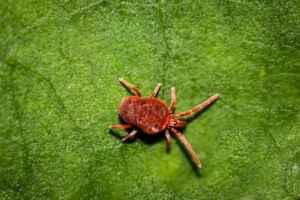
Related Questions
Why are there chiggers in my backyard?
As we have broken down in this listicle, your backyard could be attracting chiggers for a myriad of reasons. Most likely, you may have let your yard become too overgrown. Chiggers love to hide in the tall grass as that allows them to easily attach to a host walking through. The tall grass will brush up against to host and the chigger will climb aboard. Chiggers do not drink the blood of their host, instead feeding off of their skin cells. Only their larval stage is parasitic. They latch on and inject an enzyme that allows them to dissolve and consume the skin cells. This enzyme is what causes the itchy welts left behind after feeding. The easiest way to prevent your yard from becoming a chigger hotspot is by keeping your lawn well manicured. Not only is it the easiest solution, but it is also the cheapest.
What are chiggers?
Chiggers are red, tiny, and have 6 legs. When the chigger reacher maturity, they get 8 legs. Because of their size, it is highly unlikely that you will find just one chigger on your body, but you may be able to spot a cluster due to their bright red color. Surprisingly, they belong to the Arachnida class, hence their other nickname, the spider mite. Bites are commonly found on parts of the body where the skin is thin, such as the ankles. You will also find bites around the crotch and bra line where clothing restricts further exploration of your body.
Conclusion
In conclusion, the best, most cost-effective, and natural methods to keep chiggers from infesting your yard are by keeping your lawn well maintained, using DIY essential oil repellents, and removing trash bins from the yard. By keeping your grass from growing too tall, chiggers will be less likely to make their home in your backyard. Essential oils such as peppermint and lavender can prevent chiggers from biting you while also being gentle on the skin and free from chemical odors. Additionally, damp and smelly trash cans are a breeding ground for chiggers. For example, by cleaning up the yard after a storm and keeping trash bins out of the grass, you can drastically cut down on the number of chiggers in your yard. Have any of these methods worked for you? Be sure to let us know your favorite natural chigger repellents in the comments, we would love to hear your tips and tricks!

